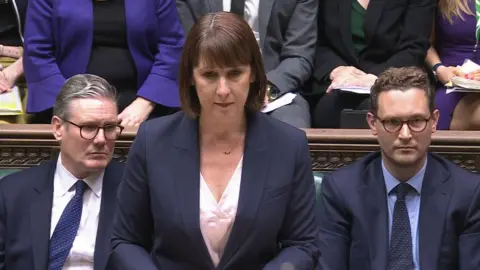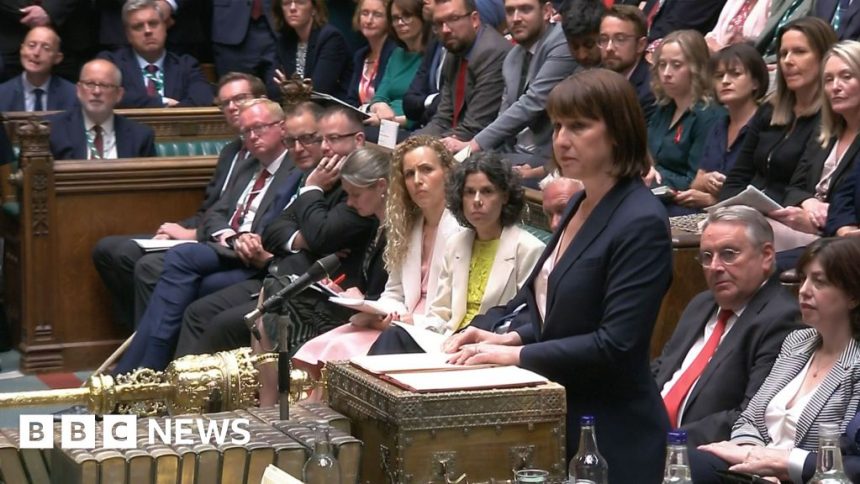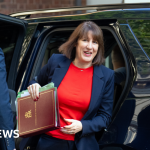Winter fuel payments scrapped for millions
 UK Parliament/PA
UK Parliament/PAAround 10 million pensioners will lose their winter fuel payments under new plans announced by the chancellor.
From this autumn, those not on pension credit or other means-tested benefits will no longer get the payments.
A planned cap on social care costs and several major rail and road projects have also been axed.
Ms Reeves said she had to make “urgent decisions” because of the previous government’s “undisclosed” overspending, but shadow chancellor Jeremy Hunt said her claims were “spurious”.
The Conservatives had been open about the state of the public finances while in power and Ms Reeves had held talks with Treasury officials before the election, Mr Hunt said.
During her speech to a packed House of Commons, Ms Reeves said public sector pay recommendations were being accepted in full, meaning 5.5% rises for NHS workers and teachers, 6% for the armed forces, 5% for the prison service, and 4.75% for the police.
In addition, junior doctors have been offered a 22% pay rise over two years.
The pay deals will cost an additional £9bn, with two-thirds of this funded by central government, with a third expected to be found from savings within departments.
However, most of Ms Reeves’ announcement was focused on cuts because of what she said was a “£22bn hole in the public finances”.
Some economists, including the Office for Budget Responsibility (OBR) and the Institute for Fiscal Studies (IFS), appear to have backed some of Ms Reeves’ claims.
But her decisions have been called a “political choice” by economists and Conservative politicians.
The following infrastructure projects have been scrapped:
- A plan to build a two-mile road tunnel close to Stonehenge. Its costs so far amount to £166m in the planning stage
- A plan for an A27 Arundel bypass in West Sussex. Estimated to cost at least £320m, this had been put on hold by the previous government until 2025
- Former Prime Minister Boris Johnson’s plan to build 40 new hospital in England by 2030 at an estimated cost of £22.2bn
- The Restoring Your Railway Fund – a scheme designed to reopen previously closed rail lines, for which £500m was allocated by the previous government
A visibly angry Ms Reeves said the former government had committed to spending money it did not have and that it did not tell the OBR about this.
“How dare they,” she said, calling the Conservatives’ economic record “unforgiveable”.
Ms Reeves said the unfunded overspend from the previous government included £6.4bn on the asylum system, including the Rwanda scheme, and £1.6bn in transport.
The OBR said in a letter published on Monday that it was “made aware of the extent of these pressures at a meeting with the Treasury last week”.
It said this could “constitute one of the largest year-ahead overspends against… forecasts outside of the pandemic years”.
As a result it is reviewing how it prepared its forecast for the March 2024 Budget and will assess “the adequacy of the information and the assurances provided to the OBR by the Treasury regarding departmental spending”.
Paul Johnson, director of the IFS, said the £6.4bn overspend on asylum this year was a “huge number” that “does genuinely appear to have been unfunded”.
However, he added that “half of [the] spending ‘hole’ is public pay over which government made a choice and where pressures were known”.
Mr Hunt denied the previous Conservative government had covered anything up and accused Labour of misleading the public on tax rises.
“Taxes will have to go up, and she chose not to tell us,” he said, forecasting that Ms Reeves’ first Budget will be the “biggest betrayal in history by a new chancellor”.
The chancellor said during her speech in Parliament the next Budget would be on 30 October.
She also made several other announcements:
- A planned cap on care charges for older people has been scrapped, which Reeves said would save £1bn
- The planned sale of publicly-owned NatWest shares has been axed as it “would not represent value for money”
- The Rwanda deportation scheme for illegal migrants has been scrapped, in line with Labour’s manifesto promise
- Public sector spending reviews will happen once every two years – the last one happened in 2021
- All departments have been asked to find savings totalling at least £3bn
- The Advanced British Standard, a qualification which former prime minister Rishi Sunak said would replace A-Levels and T-Levels, will not go ahead
- A Covid corruption probe will try to get back the £2.6bn Labour says was “lost” in dodgy contracts signed during the pandemic
- Private schools will be taxed at 20% from 1 January next year
Liberal Democrat Treasury spokesperson Sarah Olney urged Labour to make different choices, such as asking large companies to “pay their fair share” of tax.
Labour has previously said it will not borrow to fund “day-to-day costs”, which means it would only pay for current expenditure using the money it raises in tax.
However, borrowing can be used to finance capital investment under these rules, leaving it some wiggle room on projects like HS2.
During the election campaign, the Conservatives made similar commitments on taxation and spending.
Economists said at the time both parties would either need to cut spending or raise taxes under their self-imposed fiscal rules.








